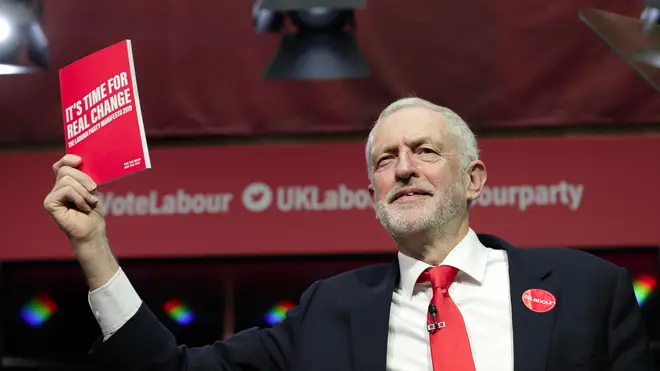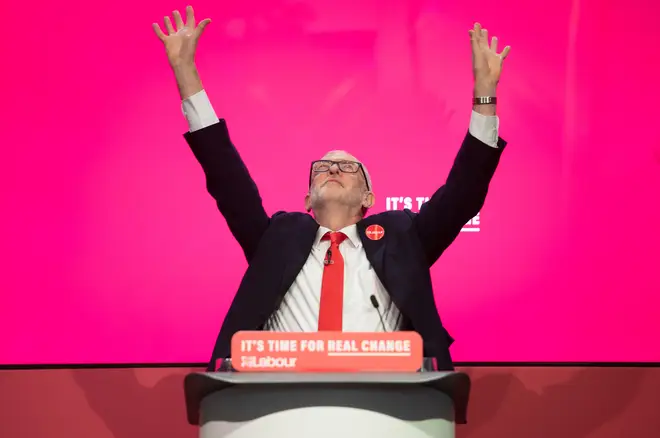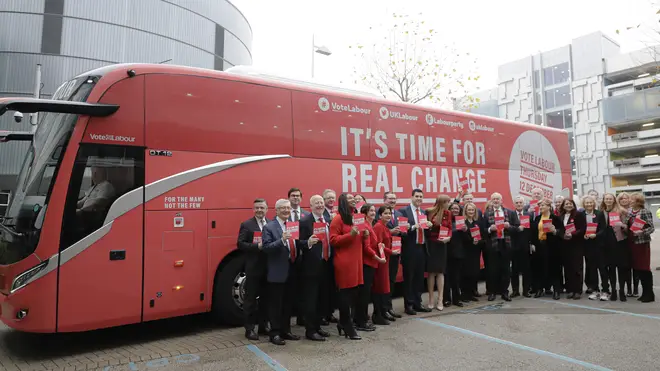
Ben Kentish 7am - 10am
25 November 2019, 09:32

Jeremy Corbyn launched Labour's "It's Time For Real Change" manifesto ahead of the general election. Here is what you need to know.
The Labour party leader said the manifesto was “the most radical and ambitious plan to transform our country in decades” during a speech at Birmingham City University.
Mr Corbyn called his pledge to the electorate a "manifesto of hope" and promised he would "transform" the UK through renationalising water, energy, rail and mail.
In the 105-page document he also vowed to protect the NHS, tackle the climate emergency and cap rents in the private rental sector.
So what does Labour's manifesto launch reveal about their position on some of the key issues in the run up to December's general election?
As previously stated, Mr Corbyn would renegotiate a new withdrawal agreement with the EU by March and would put that deal to the public via a referendum within six months of the election.
He has not revealed which way his party would campaign in a second ballot, however the result would be legally binding in order to put an end to the Brexit process.
The plan is to not appeal to just Leavers or Remainers alone, but instead to appeal to both sections of the country in order to give the people the final say.
Another detail worth noting is its lack of a commitment to keeping free movement - even if Remain were to win - but instead it recognises the benefits of immigration.
With the NHS once again coming to the fore in the run-up to December's election, Labour has announced its plan to increase the amount it spends on the health budget by 4.3 per cent each year.
This figure is at the top end of what health think tanks have been demanding and, more notably, it would seek to reverse the privatisation of the service.
They would offer free annual dental care check-ups, free personal care for the elderly, free prescriptions and free hospital car parking. A £1.6 billion boost per year would also be given to mental health services.
Funding for such provisions, Labour says, would come from other areas such as increasing corporation tax and levying taxes on the wealthier in society.

Labour's plan to revamp the public sector is one of its most ambitious and controversial policies, with ideas of renationalising water, energy, rail and mail.
Moving so many key industries into state ownership would be the most radical overhaul since the early post-war years.
Additionally, Mr Corbyn plans to deliver free full-fibre broadband to everyone in the country through a publicly owned company.
People working in the public sector would immediately receive a five per cent boost in their pay, with year-on-year above-inflation pay rises following.
Labour have made a commitment to introduce a "real living wage" of at least £10-an-hour to all workers over the age of 16.
The plan is to tackle in-work poverty, which will be supported by improving workers' rights via longer maternity and paternity pay, as well as guaranteed bereavement pay.
Other protections for workers include ending zero-hours contracts and strengthening the rights and powers of trade unions.
Labour's leadership has set out its plan for a "green industrial revolution" which would give the UK employment market a boost to the tune of one million jobs.
The proposals would shift industries, including gas, electricity, transport, agriculture and construction, on to renewable energy modes.
Mr Corbyn's plan is to get as close to the net-zero carbon emissions target by 2030, however it has not made this an outright obligation, saying it would "aim to achieve the substantial majority of our emissions reductions" by that target date.

Welfare
Labour would scrap Universal Credit but has not outlined how it would be replaced. The two-child limit for benefits and the welfare cap would be reconsidered immediately.
The state pension age would be frozen at 66, with Mr Corbyn promising to review the retirement age "for physically arduous and stressful occupations."
So-called Waspi women - those born in the 1950s who have experienced a leap in the pension age - would be guaranteed compensation and a triple-lock on the annual state pension would continue.
Education
Labour would scrap Ofsted and SATS tests at Key Stage 1 and 2 and would give councils and head teachers power to run their schools, instead of academy bosses.
The party has vowed to offer 30 hours of free childcare to all children at pre-school, as well as scrapping university tuition fees and reintroducing maintenance grants.
Crime
Mr Corbyn has committed to employing 22,000 more police officers, 2,000 more than Boris Johnson's promise and 1,000 more than those cut by the Conservative Party since 2010.
A royal commission would also be set up in order to investigate the decriminalisation of drugs.
Housing
The largest overhaul of housing since the 1960s is also promised, with 150,000 homes built per year, two-thirds of those built by councils, and all part of a £75 billion plan.
Non-homeowners would see rental caps and open-ended tenancies under a Corbyn-led administration and a £1 billion fire safety fund would be set up in order to prevent a repeat of the Grenfell tragedy.